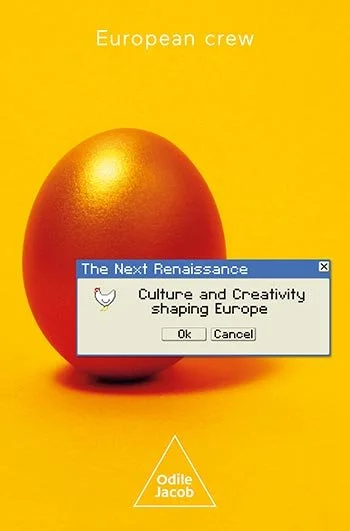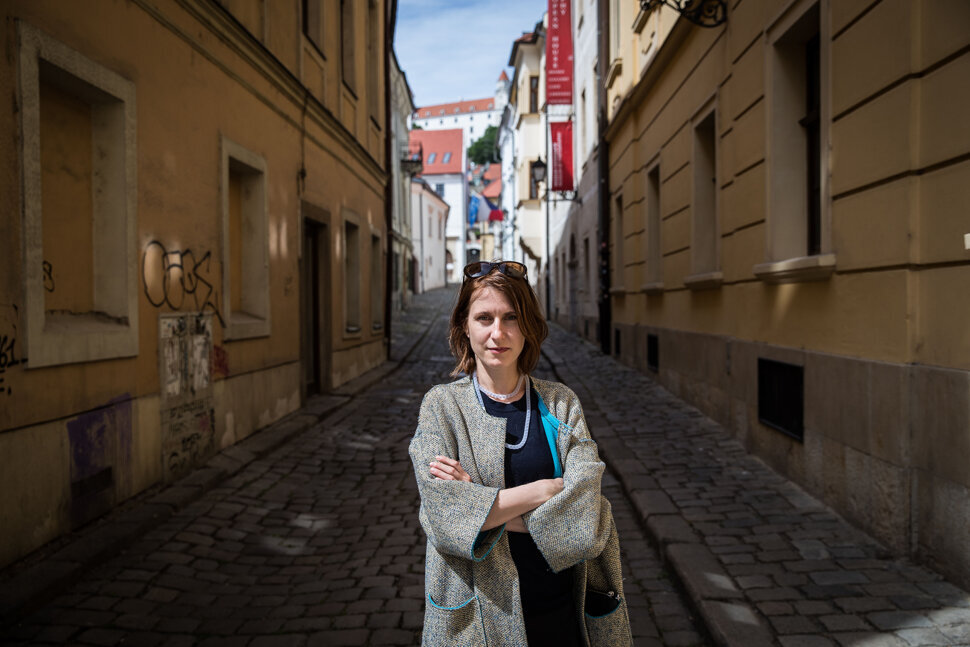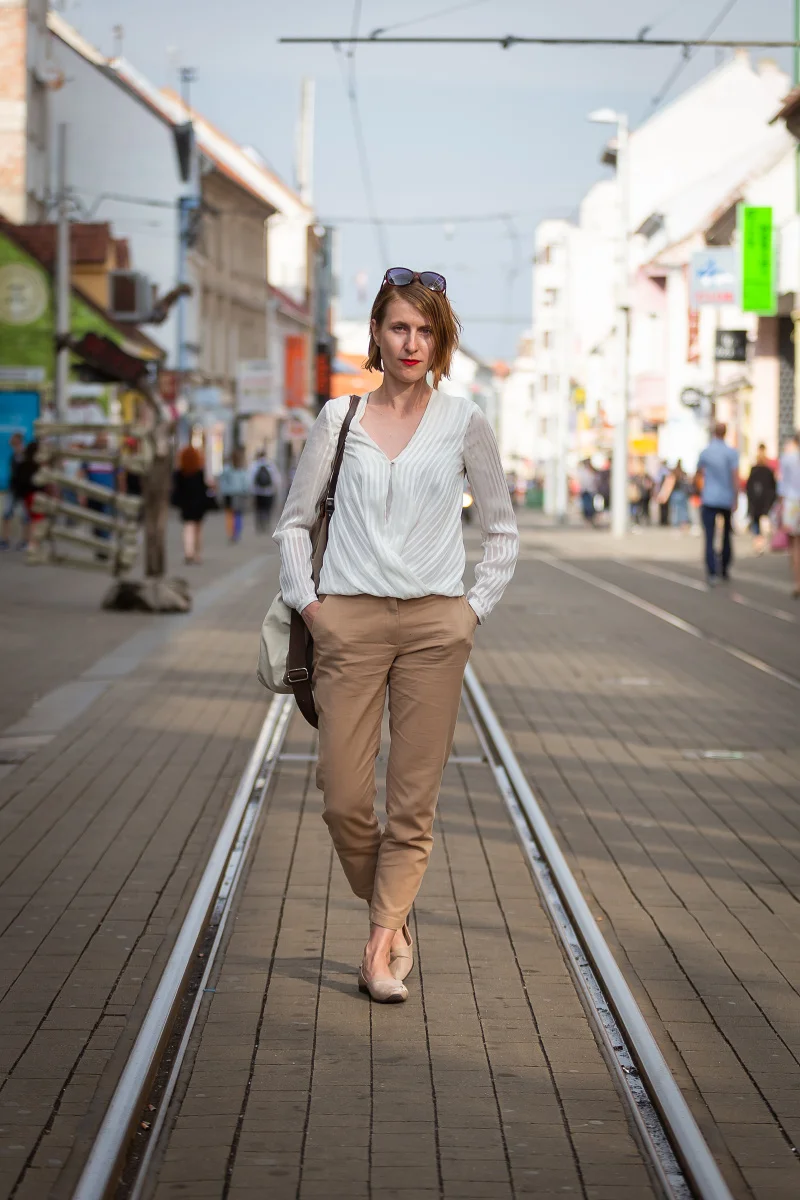We are a European crew made of artists, academics, entrepreneurs! More than 60 European contributors, from all generations and from 15 countries, came together to give reasons for action and build a common place for culture, creativity, and innovation in Europe. In these times of multiplicities of changes—despite or because—a novel type of change is taking shape. It is a transition that empowers a real movement, leaving behind hustling from one state to another: thinking more slowly, more deeply, more from a 360° perspective, and more caring beyond quick fixes. It is a compelling story mixing art, tech, and innovation. Together it is all transformative.
Milota Sidorová shares her thoughts about the quality of life in Bratislava, its further sustainable development and the challenges that the city is likely to face in the years to come.
On the first death anniversary of New York-based architect Michael Sorkin, four of his students reminisce fond moments and the biggest learning from their mentor.
Do cities work the same way for everyone? And what -everyone- means? These questions will be addressed by a Canadian urban geographer, professor and writer Leslie Kern. In 2019, she published the book Feminist City, in which she describes how difficult it is for women to live comfortably in cities planned by men. How important is to include the feminist view to urbanism? Discussion will be moderated by Milota Sidorová.
From facing initial resistance to launching a new reality, women working in arts and culture have had a profound impact on cultural institutions and their working environment over the years. Not only have female cultural practitioners contributed to the transformation of societies, but also the growing number of women in leading positions.
Landscape architect MILOTA SIDOROVÁ, whose work is about fairer urban planning, explains what could replace trees in cities, as well as how to create a park without having to take up new land, or how housing and shopping in cities and airports changes in a pandemic.
"When we go back to flying again, will we want thousands of people to move around the airport, shopping for hours, or will we try to speed up the flow of those people? These are logistical and hygiene issues, but they also affect capitalism," she says.
More bicycles, buses and trams should shape the cityscape in the future. But the mobility patterns of women and men differ. Transport policy is the construction of roads - for decades the politicians in Bratislava concentrated on car traffic as if there were no local transport and bicycles. Setting up new bus lanes was almost breaking a taboo. Politicians admitted to cycling, but it suffered from implementation. This has had consequences to this day: Less than two percent of all trips are made on bicycles.
It is so omnipresent to the point of ignorance. Mostly we try to ignore it, or we try to fight it - in any case, it is here, it gets under our skin and affects us in a fundamental way. Kultural Centre launches workshop on how to look at visual pollution and fight it in professional way. Urbanist and chief editor of the first manual of outdoor advertising in Slovakia, Milota Sidorova will hold workshop in which she outlines lessons learnt from Bratislava and propose ways how to deal with visual pollution in other cities. The event is part of the project Public Spaces Live (VPN), in which we focus on the public space of the city from different perspectives (architectural, sociological, ecological, urban, economic ...) . The project is financed from public sources of the EU Effective Public Administration program administered by the Ministry of Interior of the Slovak Republic.
Creative Mornings Prague will focus on gender perspective of architecture and urbanism. The Creative mornings story began in 2008 in New York. The concept was simple: breakfast and a short lecture on Friday morning once a month. In summer edition Milota Sidorova, urban development specialist will cover architecture and urban planning from a gender perspective. She will present practical examples of gender sensitive design that can contribute to improving the quality of Czech and Slovak urban planning.
Urban planner Milota Sidorova has had an unusual summer - in 22 days she covered 6,718 km across 20 European capitals and cities. Zuzana Golianová from Radio DEVÍN will ask about her journey, how does the urban planner see / experience cultural differences of European countries? What is her personal reflection and perhaps direct recommendations for us, travelers and Bratislava?
“Evolving Community – Building Togetherness” is a main topic of Nürnberg’s bid for becoming European Capital of Culture 2025. Who defines togetherness in a city und who makes the city? Which cities are good examples for co-creating a city and what can we learn in Nürnberg to build more togetherness in the development of our city? In a workshop led by the Brazilian urbanist Laura Sobral co-creators from civil society groups and city administration in Nürnberg will develop approaches for cooperative urban development.
𝗪𝗵𝘆 𝗪𝗲 𝗡𝗲𝗲𝗱 𝗠𝗼𝗿𝗲 𝗪𝗼𝗺𝗲𝗻 𝗶𝗻 𝗖𝗶𝘁𝘆 𝗣𝗿𝗼𝗳𝗲𝘀𝘀𝗶𝗼𝗻𝘀 (English)
Slovkian urban planner Milota Sidorova talks about why we need more women in professions such as city administration and urban development.
Even people with totally different opinions must find a value intersection to be able to listen and talk together. Therefore, on July 5, we will be looking for a common denominator in the New Building of the Slovak National Theater. Come and experience 16 unique performances, a number of original surprises and one inspiring day that will change your perspective for the rest of the year. It will be festive.
Once you realize it, it makes a profound sense: men and women use the public space differently. Transport, playground, but also cemeteries. But city planners often do not think about the different needs of people. Milota Sidorová is in the Czech Republic and Slovakia in order to change it. A graduated landscape architect has combined urban planning with sociology and other humanities, and offers another recipe to change it - to help female architects stand out.
Milota is expert on gender-sensitive urban planning. The differences between men and women using the public space were clarified in her presentation at PechaKucha Night Bratislava on the topic of masculinity.
In the beginning of April, I participated n the Budapest Young Leaders' Forum where we debated on the Future of Cities.
The lecture focused on exploring architecture and urban planning through gender optics that allows us to uncover many inequalities and neglected urban development. In the lecture brought practical demonstrations of gender sensitive design and planning, mobility of care from different foreign cities. In the latter part conclusion were made for possible solutions and stimuli for increasing the quality of planning of Slovak cities.
Specialist on public space Milota Sidorova will explore why today's well-functioning cities and civic communities are more important than ever. She will present ideas and reasons how can people like her (architects, urban planners, community managers, or social innovators) contribute to sustaining democracy
If you follow events in Central Europe and Slovakia, you will realize how important this time is to us. There are many exciting and fundamental things affecting our lives, political arrangements, deciding on our course, the future of democracy. How to grab all this and connect it meaningfully on the city level? I live by interdisciplinarity and one of the greatest experiences in life I consider knowledge. At the same time, I like to get to know patterns of human behavior. Therefore, in this paper, I would like to summarize moments from my practice as a planner, presenter, facilitator and woman who connects. I will talk about cities, self-government and the role of professors in a time of threatened democracy.
The two most significant industries in Bratislava are construction development and PR and marketing. We got used to development projects that create their own name, brand, story, visualization. They appear not only on billboards, but also in social media, publish their magazines, invest a lot in PR and promotion. However, in the historically unprecedented intensity of construction and sales of the capital's flats, it is good to take a step aside and think critically about what really defines a neighborhood with a good life and what qualities we recognize in the information overload? What constitutes neighborhood identity - how does marketing change and where are its boundaries?
Have you ever wondered how different men, women, children and seniors live and work in cities and suburbias? Do you know how these groups usually move around the city and what obstacles they have to face? To what extent do we realize how bad the city's infrastructure, the cars on the sidewalks or the lack of large trees make our lives worse? In this edition of the Female Gender, with the urban planner Milota Sidorova, we will talk about livable cities, the women's view of the profession, the world around us, and how important it is to support women in the profession.
Facilitated workshop on the renewed position of chief architect in Nitra. The panel was part of the all-day conference organized by the City of Nitra.
Restless Cities: Lessons from Central Europe is a publication edited by Milota Sidorová and Zdeňka Lammelová that reflects a year-long training programme of the Prague office of the Heinrich-Böll Foundation focusing on understanding the political aspects of urban planning in the Czech Republic, Slovakia and Hungary. It consists of four thematic chapters that offer introductions into social housing in Brno, participatory processes in Prague, urban development of Bratislava and influencing strategies in Budapest.
Climate change is beginning to affect our daily lives. For example, this summer it happened to me that I had to cancel a meeting with my colleague from Piešťany because she could not come to Bratislava. Because of the extreme heat, the tracks broke and trains got stuck. The tracks were simply not designed for temperatures of new summers. This is a practical demonstration of the impact of climate change on today's technology. Today we do not need to make cosmetic repairs, plant trees or flowers in pots, pour black asphalt roads - what we see in Bratislava. We have to get underground. This means bringing together and involving all those in charge of urban networks, that's the beginning.
It is very difficult to catch Milota. Just shortly before our conversation in a pleasant interior block of Panenská Street, she returned from Japan. We spent an hour's interview mainly on Bratislava and its upcoming changes. A public space expert perceives very sensitively non-systemic solutions for managing cities and neglecting the needs of weaker groups in city planning. She believes that Bratislava will also benefit from the positive experience with the transformation of the Prague self-government and the streets of Ljubljana.
We cordially invite you to an event, the first of its kind - aimed at networking and sharing experiences, organized by prominent Czech and international organizations involved in raising awareness of gender equality, architecture and spatial planning. How to design a fair shared city? What is gender mainstreaming? How can we use its principles to improve the quality of architectural practice and spatial planning and thus the quality of life in cities?
In the discussion held at the Slovak Technical University we spoke about opportunities and obstacles how can Bratislava become greener city. Guests: Zuzana Hudekova, Boris Hrban, Dasa Effenbergerova, Patrik Krizansky, Michal Marcinov. Moderator: Milota Sidorova Language: Slovak
Architecture is a field in which ever more dominated by men. Their word carries more weight and confidence. Why is this so? The fact that architecture needs more women talking Milota Sidorová. Language: Slovak
Are we all equal when it comes to the use of public space? How different are the needs of men, women and other groups living in our cities? How can we create space that is offering its fair share to everyone? Language: English
Over the breakfast we were discussing the topic with three powerful women working in real-estate industry. Jana Musilova, Co-owner, vice-chair woman of LIKO-S, Nada Ptackova, CEO, Skanska Reality and Viktorie Souckova. Moderator: Milota Sidorova.





























